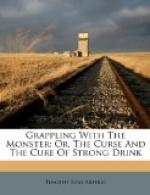“Miserable in principle,” says Judge Pitman, “license laws were found no less inefficient in practice.” Meantime, the battle against the liquor traffic had been going on in various parts of the State. In 1835, a law was secured by which the office of county commissioner (the licensing authority) was made an elective office; heretofore it had been held by appointment. This gave the people of each county a local control over the liquor question, and in the very first year the counties of Plymouth and Bristol elected boards committed to the policy of no license. Other counties followed this good example; and to bar all questions of the right to refuse every license by a county, the power was expressly conferred by a law passed in 1837.
A CHANGE FOR THE BETTER.
The good results were immediately apparent in all places where license to sell intoxicating drinks was refused. After a thorough investigation of the matter, the Judiciary Committee of the Legislature reported the evidence to be “perfectly incontrovertable, that the good order and the physical and moral welfare of the community had been promoted by refusing to license the sale of ardent spirits; and that although the laws have been and are violated to some extent in different places, the practice soon becomes disreputable and hides itself from the public eye by shrinking into obscure and dark places; that noisy and tumultuous assemblies in the streets and public quarrels cease where license is refused; and that pauperism has very rapidly diminished from the same cause.”
An attempt to prohibit entirely the retail liquor traffic was made in 1838, by the passage of what was known as the “Fifteen-Gallon Law,” which forbade the sale of spirituous liquors in a less quantity than fifteen gallons, which had to be “carried away all at one time;” except by apothecaries and practicing physicians, who might sell for use in the arts and for medicinal purposes.
But this law remained in operation only a year and a half; when, in concession to the liquor interest of the State, which had been strong enough to precipitate a political revolution and get its own men in the legislature, it was repealed.
“But the State,” says Judge Pitman, “while the memory of license was fresh, was not to fall again under its sway. The struggle for local prohibition was at once renewed, and in a few years license had ceased throughout the Commonwealth. The statement may surprise many; but I have the authority of the city clerk of Boston for saying, that ’no licenses for the sale of intoxicating liquors were granted in Boston between 1841 and 1852.’ * * * And so the chapter of license was apparently closed. It had not only had its ‘day,’ but its centuries in court; and the well-nigh unanimous verdict was: ‘disgrace—failure’”
So strong was this conviction in the minds of the people of Massachusetts, that Governor Bullock, in 1861, while acting as chairman of the Judiciary Committee of the House, gave it expression in these notable words: “It may be taken as the solemnly declared, judgment of the people of the Commonwealth, that the principle of licensing the traffic in intoxicating drinks as a beverage, and thus giving legal sanction to that which is regarded in itself as an evil, is no longer admissible in morals or in legislation”




